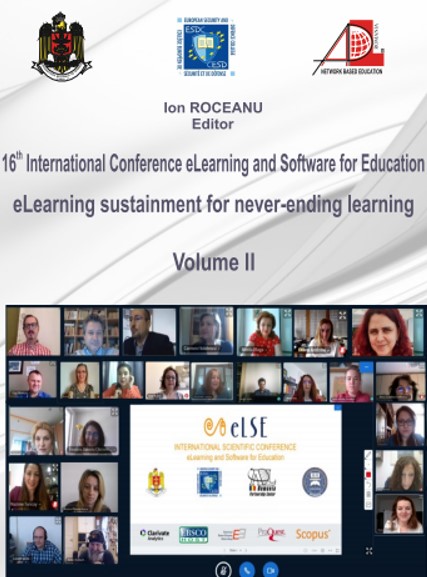E-LEARNING RESOURCES AS A MEANS OF ORGANIZING STUDENTS' INDEPENDENT WORK
E-LEARNING RESOURCES AS A MEANS OF ORGANIZING STUDENTS' INDEPENDENT WORK
Author(s): Natalia Sivtseva, Svetlana Latysheva, Zhanna Songolova, Elena SOLODKOVASubject(s): Foreign languages learning, Higher Education , ICT Information and Communications Technologies, Distance learning / e-learning, Pedagogy
Published by: Carol I National Defence University Publishing House
Keywords: e-learning resource; soft skills; communicative competence; English language teaching; final state exam; students' independent work;
Summary/Abstract: The participation of Russia in global processes and the necessity of its integration into European and global educational spaces have caused the urgent modernization of the national educational system. Currently, due to the two-level system "Bachelor - Master" provided by the Bologna declaration modern methods of teaching related to increased academic freedom become generally available for the Russian educational system. Students have the opportunity to study at foreign universities and receive their second diplomas there. These changes led to higher academic mobility, which is considered to be a factor improving the quality of education. Thus, a lot of attention is paid not only to the issues of professional training of technical specialists; the problem of foreign language acquisition comes to the fore. This is relevant throughout all the levels of education and carrier on a nationwide scale, as not only students can get education abroad, specialists who are fluent in foreign languages can present the results of their scientific work to their foreign colleagues, improve their qualifications, study foreign technical developments, etc. In this regard, it was decided to include the final state exam in a foreign language in the curriculums of Irkutsk National Research Technical University (INRTU). This article is an attempt to justify the relevance and topicality of such an innovation, to describe the structure of the state exam; it presents the assessment of students' retained knowledge, which makes it possible to assess their level of language proficiency effectively. The necessity of transition from the traditional exam format to a format that allows assessing students' potential and level of language proficiency required by a specialist is proved. Students' willingness to pass such an exam depends not only on their acquisition of general foreign language competence, it presents their ability to work with scientific professionally-oriented literature in a foreign language, the level of their oral and written scientific communication skills that require knowing principles of business communication. Besides, one of the main tasks of a foreign language teacher training students for such an exam is to expand and strengthen interdisciplinary connections for the development of students' professional foreign language competences. Thus, as there appears a need to organize students' independent preparation for the exam (the gap between the classroom sessions and the exam is three terms), the article pays great attention to the development of electronic resources that provide high-quality independent training for students.
Journal: Conference proceedings of »eLearning and Software for Education« (eLSE)
- Issue Year: 16/2020
- Issue No: 02
- Page Range: 488-495
- Page Count: 8
- Language: English

